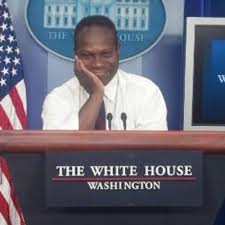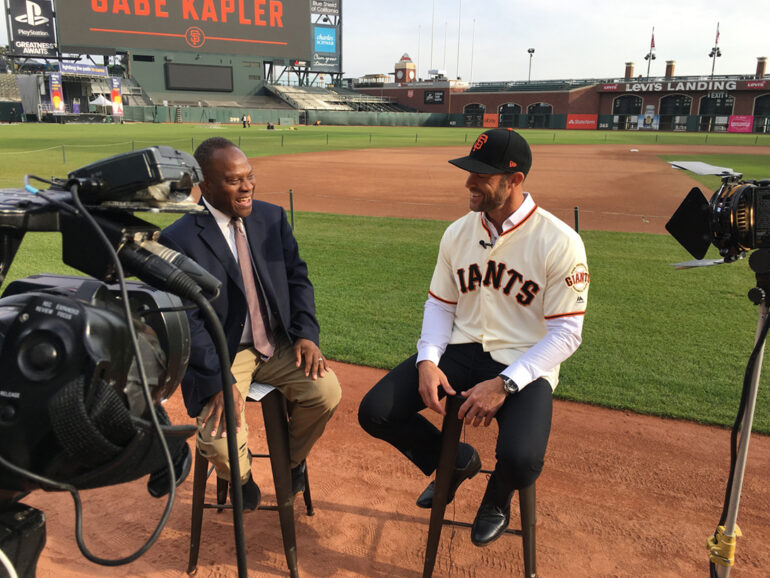On November 13, Gabe Kapler became the San Francisco Giants’ 17th manager. The hiring of the 12 year MLB outfielder by President of Baseball Operations Farhan Zaidi was also the team’s most polarizing, due to issues during his time as Philadelphia Phillies manager and as head of the farm teams for the Los Angeles Dodgers (Kapler was cleared of any wrongdoing). Kapler played in the major leagues from 1998 to 2010 for the Detroit Tigers, Texas Rangers, Colorado Rockies, Boston Red Sox, Milwaukee Brewers and Tampa Bay Rays. He won the Class AA Southern League Most Valuable Player Award, and was voted Minor League Player of the Year by USA Today. He served as a coach for the Israeli national baseball team and as Director of Player Development for the Dodgers.
Below is our chat following his introductory press conference.
Now for a few moments with Gabe Kapler, the Giants’ new manager. How does that sound to you?
I’m still processing it all, it’s really humbling actually. When I put the jersey and the hat on in the press conference, it reminded me that I’m one of 30 managers in Major League Baseball but more specifically, the opportunity to be the manager of an iconic franchise, with as passionate and intelligent a fan base as this is, in a city as diverse and open as it is, is mind blowing. I feel really lucky right now.
You’re a young man – you’re only 44-years-old and you’re already on your second team as skipper.
I think one of the cool things about being in Philadelphia was I learned a lot of lessons. I had some of the rough edges smoothed out, and then was reminded that I have a long way to go, as it relates to learning and being better at the job of being the manager of a Major League Baseball team.
What would you say is your biggest take-a-way from your experience as Phillies manager?
I’m kind of wired to try and get every little strategic advantage in the game. I’m just naturally very competitive. I love to win. It’s very important.
At anything? Even checkers?
Yeah, even if you’re having a healthy debate with somebody, you want to walk away feeling like you did a job in that conversation. Being that way, I also recognize that in-game decisions become very competitive as well. One of the things I learned in Philadelphia is you can’t make those strategic in-game decisions at the expense of confidence with your players. You might get a small upgrade in a match-up, but it might take away some confidence from the player you might be pinch hitting for or taken out of the game to replace him with somebody else. So, understanding that has a ripple effect: you might get an upgrade in a game but for five games going forward you might lose a little confidence. There’s a little psychological game that happens within the dugout and between the lines. One of the things I learned in Philadelphia is just how to be cognizant of the balance between using the best information that we have and instilling confidence in the players.
You know what I like about you? Your transparency. I’ve been to a lot of press conferences. I didn’t know what to expect today, and you just took it head on. You took some tough questions. Susan Slusser, Ann Killion, Janie McCauley, those are three of the titans in this market as far as scribes go, and you just took it on.
I think the reason that they’re titans and the reason they’ve been so successful in their careers and why they’re so well-respected is because they ask the tough questions. And they are committed to change. So, in order to have a voice in this community, you have to hold people accountable. And I don’t mind that. I think it’s good for society. It’s good for sports franchises. Baseball needs to change, and move forward and be better at handling some of these issues that we tackled during my time in Los Angeles. I didn’t handle those situations as well as I could have, so tackling it head on and being open about it is something that’s important.
In this day and age, it’s all about perception and the brand. Starting off, I don’t know if when you feel like you’re down 8-0, and all of a sudden feel like you’ve got to play defense. When somebody kind of looks at you and the perception (of you) is, “well I don’t know”, how do you go about turning that around?
By not trying to turn it around in one day. Not trying to turn it around in one conversation. Knowing that trust and belief is built over a long period of time. Being very consistent with my actions. And one of the actions is getting out in the community and doing good work.
I know you know a few guys in the clubhouse. I know you played with Longo (Evan Longoria), and you might know Stephen Vogt if he’s around. I can see Longoria taking this picture (Vern pulls out an old picture of Kapler, shirtless with a bat on his shoulder) and saying “Hey! This is our new manager!”
(Laughing) That’s a young kid. I don’t even recognize that guy. It’s really interesting, that was at a time in my life as a baseball player where I was able to enjoy those moments. Having my teammates bust my chops for it over the course of my life has given me thick skin.
One of the great things about being in a Major League clubhouse is you’re totally exposed every single day. You’re around these guys as much as you’re around your family sometimes. And they are constantly busting your chops. Sometimes it’s really important to have a sense of humor and roll with it a little bit.
So what happens now?
I think there’s a couple of things that have to happen. First, I need to go on a listening tour. This means talking a little bit less and asking a lot of questions, being inquisitive. That is specific to our players, to the people in this organization who have seen much more than I have. And start to acquire a file about what’s been going on. Certainly in the interview process I did a lot of that. There’s a lot more listening that needs to be done. Secondly, I need to hire a dynamic coaching staff that I can depend on so when maybe I’m not there, really good things are happening. And maybe I can focus my attention on a player or a conversation like this, and know that our coaching staff is collaborative and working as a team to develop our players.
How does the team work? Does Farhan Zaidi say “Y’ know, I have a vision,” and Scott Harris (Giants General Manager) says, “Hey! That’s great! I’ll run it to Gabe.” And Farhan says, “No no, let’s walk in there together,” and you all three come to a mutual decision?
The visual you just laid out, is something that’s very exciting to me: I think very good decisions come out of healthy debate. Sometimes, we’re on the same page right away. But often times the best decisions, the way you take the best steps forward, is by having a healthy back and forth and a debate respectfully, with sensitivity, but also with some strength and conviction. And you walk out of the room having new ideas and being arm and arm, shoulder to shoulder, and doing things together as a team.
 Vern Glenn is a two-time Emmy Award winning Sports Anchor/Reporter for CBS affiliate KPIX in San Francisco. His career in local television sports spans 35 years, the last 30 in the Bay Area.
Vern Glenn is a two-time Emmy Award winning Sports Anchor/Reporter for CBS affiliate KPIX in San Francisco. His career in local television sports spans 35 years, the last 30 in the Bay Area.

